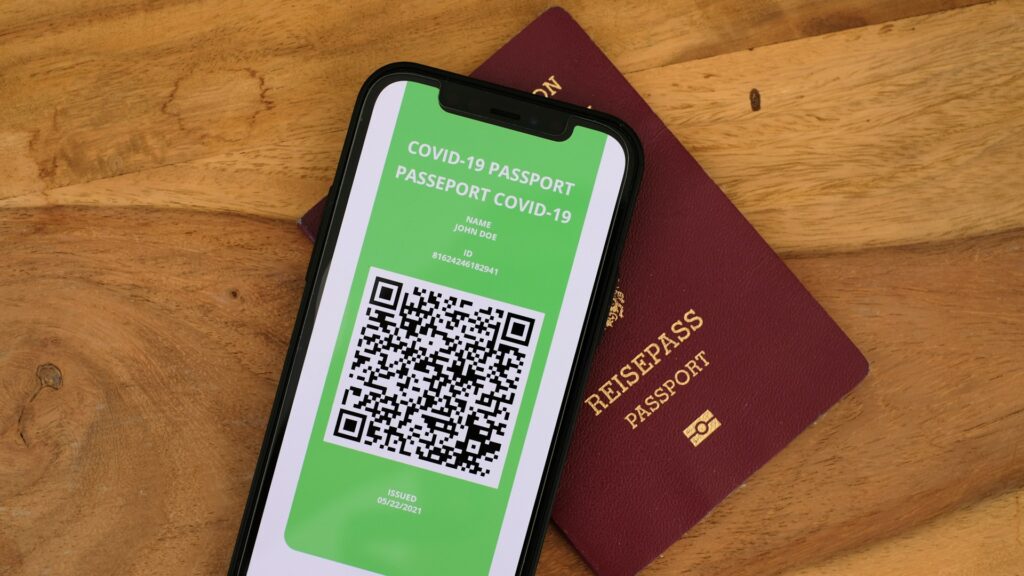Many people need to show proof that they are healthy and safe from diseases like COVID-19. Digital health passports are tools that let people prove if they have been vaccinated or tested negative. These passports can be on phones or computers as cards or codes. They make it easier for people to travel, go to events, work, or school safely.

News Reading in Levels
Digital health passports are becoming more common in our daily lives. They help keep us safe from illnesses like COVID-19. These passports show if you have been vaccinated or tested negative recently.
Many places now require proof of health status. Airports and airlines often ask for vaccine cards or negative test results before you can travel. Concerts, sports events, and conferences may also want to see your health passport to allow entry. Some workplaces and schools need vaccine records too.
Using digital passports makes it easier to show your health information. Instead of carrying paper documents, you can simply show a code or card on your phone. This helps prevent the spread of diseases by ensuring everyone is healthy.
Vaccine: A substance that helps protect the body against a specific disease.
Negative: Showing that something is not present or does not exist.
Entry: The act of going into or being allowed to go into a place.
Workplace: A place where people go to work, such as an office or factory.
Record: An official document that provides information about something.
The COVID-19 pandemic has accelerated the adoption of digital health passports, which offer a convenient and streamlined way to share one’s health status, including vaccination records or test results. These digital tools provide a standardized approach to health documentation, reducing the need for paper-based records and minimizing potential risks like loss or forgery.
One of the primary benefits of digital health passports is their ability to facilitate safe travel. Many airlines and travel companies now require proof of vaccination or negative COVID-19 test results from travelers to mitigate the risk of disease transmission. Digital passports offer a seamless solution for verifying health status and ensuring the safety of airline staff and passengers.
Beyond travel, digital health passports can also be used to gain access to venues, events, workplaces, and schools. By verifying an individual’s health status, organizers and employers can create safer environments and reduce the risk of infectious disease spread within their communities.
Accelerate: To cause something to happen or move more quickly.
Streamline: To make a process or system more efficient and effective.
Mitigate: To make something less severe or intense.
Facilitate: To make an action or process easier or more achievable.
Verify: To confirm or establish the truth or accuracy of something.
Digital health passports, while offering numerous advantages in managing public health and minimizing the spread of infectious diseases, have also sparked debates surrounding privacy concerns, equity issues, and ethical considerations. These challenges must be carefully addressed to ensure the successful and widespread implementation of such systems.
One of the primary concerns revolves around privacy and data protection. As digital health passports store sensitive personal health information, robust security measures and strict data protection protocols are crucial to prevent unauthorized access, misuse, or potential data breaches. Striking the right balance between public health interests and individual privacy rights is a delicate endeavor.
Additionally, ensuring equitable access to digital technologies and addressing the digital divide is vital to prevent exacerbating existing inequities. Digital health passports require access to digital devices and a certain level of digital literacy, which may create barriers for marginalized populations with limited resources or technological capabilities.
Furthermore, ethical considerations surrounding consent, data ownership, and potential discrimination based on health status must be addressed through clear guidelines and protocols. Ensuring that digital health passports do not infringe upon individual rights or lead to discriminatory practices is paramount for their ethical and successful implementation.
Spark: To cause something to begin or happen.
Robust: Strong and effective.
Protocol: A set of rules or guidelines for a specific situation or activity.
Endeavor: An effort or attempt to achieve something.
Paramount: Of the highest importance or priority.
Let’s check your understanding about the news!
The Bottom Line
Digital health passports offer a modern solution for proving one’s health status and promoting public safety. While they have benefits, there are also concerns about privacy, equity, and ethics that need to be addressed. With careful planning and collaboration between governments, healthcare providers, and technology developers, these challenges can be overcome. By ensuring data protection, accessibility, and ethical guidelines, digital health passports can be a valuable tool for managing public health.
